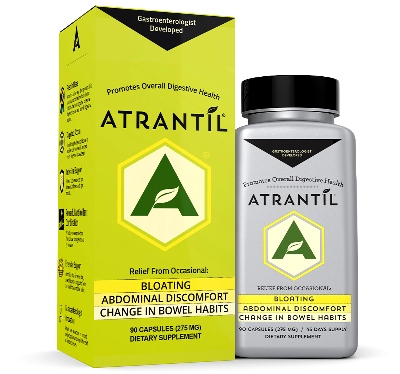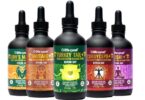Please meet the bloat-beating expert Dr. Kenneth Brown, one of the top gastroenterologists in Plano, Texas and the host of the Gut Check Project podcast. In his practice, Dr. Brown uses a mix of traditional medicine and natural therapeutics to treat patients suffering from a range of gastrointestinal issues.
He covers various digestive health topics that reflect his work in bridging the gap between pharmaceuticals and nutraceuticals. A go-to resource in his field, Dr. Brown speaks to the food that affects digestion, leaky gut, IBD and more, all while pursuing and disseminating the most cutting-edge research.
Dr. Brown founded Atrantil, an all-natural supplement formulated using three natural ingredients that help reduce bloating and abdominal discomfort and restore healthy bowel movements while feeding the gut microbiome. An innovation in its industry, Atrantil underwent multiple clinical tests, including a recent study by Northwestern University Feinberg School of Medicine. The study found significant improvements in bloating, gas, abdominal discomfort and constipation.
We wanted to find out more.
LA’s The Place: Can you share the story behind the development of Atrantil? What inspired you to create this product for digestive health?
Dr. Brown: I grew up in Omaha, Nebraska and I remember a particular morning during medical school when I scraped ice off my car at 4:30 a.m. I quickly realized I was done with the cold weather, and I decided to choose my residency as far south as possible. That decision led me to San Antonio, Texas.
While working on my internal medicine residency, I stumbled upon the field of gastroenterology. What captivated me about gastroenterology was the unique combination of performing procedures without the necessity of invasive surgery, coupled with a substantial intellectual component that I had always admired about internal medicine. Choosing this specialty was undoubtedly the best decision for my career. It is a field that fits me like a glove, and I couldn’t be happier.
I began my career in 2004 as a clinician in Dallas, Texas. I was always curious about new ways to help people and interested in research. I started a research division in my organization that allowed us to explore new frontiers in medicine. After performing pharmaceutical research for several years, I discovered a significant void in the treatment options available for irritable bowel syndrome (IBS). Recognizing this unmet need, I shifted my focus toward devising natural ways to assist my patients. It became a new chapter in my professional journey, allowing me to blend scientific inquiry with a more natural approach.
During my fellowship, I was taught that IBS is more of a psychological problem than a physical problem. It turns out that was completely wrong. The new research found an actual cause of IBS, which is bacteria growing in the wrong place, in the small intestine.
I learned by combining three large stable polyphenols, I could not only get rid of the bacteria growing in the wrong place but also decrease the bloating issues by absorbing the gas produced by the bacteria. We have since learned that these polyphenols are fantastic for helping improve the health of our microbiome.
To put this to the test, we published one randomized placebo-controlled trial where we had 88% efficacy. We then published a second study that was an open-label irritable bowel with constipation for people who had failed all conventional pharmaceutical treatments and typical natural treatments.
This patented polyphenol combination is called Atrantil. We formed KBS Research in 2015, launched Atrantil and have been helping millions of people since.
Atrantil is rooted in three specific polyphenols – Quebracho Colorado, Horse Chestnut, and Peppermint. What led you to choose these particular ingredients for the formula, and how do they work together to promote a balanced microbiome?
When I was developing Atrantil, the primary polyphenol called quebracho Colorado, was not used in supplements. So, I had to contact the only manufacturing plant in the world, which was in Argentina. Despite multiple calls and emails, I hit a roadblock.
It just so happens that I am half Argentinean, so I contacted a cousin who physically drove to the facility and explained that a gastroenterologist in Texas had found a novel use for their product in humans. This relationship has continued to grow, and we are now launching a partnership in Europe with the original manufacturer. This exciting progress happened because of persistence and luck that I had family in the same country.
In the world of health and wellness, buzzworthy ingredients come and go, but it takes something extraordinary to stand the test of time. Enter Atrantil, the groundbreaking gut health solution taking the world by storm.
Atrantil thrives on this simple yet effective formula consisting of three key ingredients:
- Peppermint extract: A natural antispasmodic, the whole leaf extract (not just the oil) helps relax the small bowel to enhance the functions of Atrantil’s other hardworking extracts. It makes it easier to expel trapped gas and is a well-known antibacterial.
- Quebracho colorado extract: This powerful antioxidant and complex polyphenol soaks up free hydrogen (a cause of problematic gas production), binds to the cell wall and disrupts the archaebacteria, which weakens the methane-producing bacteria.
- Horse chestnut extract: A natural inhibitor to the enzyme that allows methane to be produced, this extract enters the archaebacteria cell through the disrupted cell wall and shuts down the methane-producing enzyme.
LATP: Atrantil has been clinically tested at Northwestern University Feinberg School of Medicine. Can you elaborate on the results of these clinical tests and what they reveal about the effectiveness of Atrantil?
Dr. Brown: This study demonstrated the most ideal test for any over the counter solution regarding health issues such as bloating or associated gastrointestinal methane problems. First, the results demonstrated that 56% of all participants experienced adequate relief. Those results were measured against seven categories of suffering. Second, this was a 100% independent, major university medical school test constructed without bias. Third, essentially there were no exclusionary criteria for participants. These are serious parameters for any solution to meet a challenge and Atrantil more than met expectations. The integrity of the design was trusted to a worldwide recognized leader in gastroenterology, the Principal Investigator, Darren Brenner, MD, FACG, AGAF, RFF. Dr. Brenner is a professor of medicine and surgery, an IDP Foundation Research Scholar, and the director of the Northwestern University Neurophysiology Program.
LATP: Your approach combines traditional and functional medicine. How does this hybrid approach benefit patients suffering from gastrointestinal issues, and how does it relate to the development of Atrantil?
Dr. Brown: Curiosity is the most important trait of my career. My curiosity about how bacteria caused IBS in my patients and the curiosity to find a natural solution led me to develop Atrantil.
Empathy toward my patients is the root driver for my scientific curiosity. If I am failing to help a patient, that voice inside my head keeps saying, “what else can we try?”
I have a knack for seeing connections between different fields, a skill that has served me well in my career. For example, while reading an article about the use of quebracho to decrease gas in cattle, I thought about how this research could help my patients.
Atrantil aims to reduce gas, inflammation, ease discomfort, and change bowel habits. Can you explain the mechanisms through which Atrantil achieves these goals and improves overall gut health?
If someone experiences bloating after eating or has been given the diagnosis of irritable bowel syndrome (IBS) then they most likely have bacteria growing where it shouldn’t be, the small bowel. So, when you eat foods, specifically carbohydrates, the bacteria start to break down the food before you do, and they produce gas as a byproduct, and this causes bloating, abdominal pain, and even constipation or diarrhea.
Atrantil contains three powerful polyphenols that remain undigested in the intestine, allowing them to eliminate harmful bacteria while nurturing the beneficial microbiome. This unique property ensures a balanced and healthy gut environment.
The three polyphenols work synergistically to accomplish this.
First, the Peppermint calms the area down relieving pain, and it allows the other two to be able to have more time in the lumen of the small bowel. The next polyphenol is Quebracho Colorado, which is one of the largest and most stable polyphenols called a tannin. Due to its size and stability, it is able to soak up all this hydrogen gas being produced by the bacteria. Next, it is able to damage the wall of larger bacteria that use hydrogen to make methane gas. This methane is what causes constipation, and it allows more bacteria to keep growing. Finally, the chestnut is able to enter the weakened bacteria and shut down the methane production process.
So the three ingredients work together in a way that no drug or other supplement can do.
LATP: You emphasize the importance of dietary choices and lifestyle in maintaining gut health. How do factors like diet, fasting, and stress management play a role in supporting a healthy microbiome?
Dr. Brown: There are many types of fasting, but they eventually accomplish the same goal of increasing autophagy (getting rid of old and sick cells), improving insulin sensitivity, increasing growth hormones and decreasing inflammation.
Stress is a huge disrupter of your digestion and microbiome, leading to dysbiosis and an altered gut microbiome. Stress can cause changes in gut motility, leading to diarrhea or constipation, and can also increase inflammation and affect the immune system. By taking time to focus on relaxation you’re helping your whole body to heal. Try meditating, journaling, gratitude, or other relaxing practices that make you more mindful. Or try new hobbies like reading, sewing, or writing to help you wind down but still be creative.
A diet high in processed foods, added sugars, saturated and trans fats and low in fiber can promote the growth of harmful gut bacteria and disrupt the microbiome. Such a diet can also lead to chronic inflammation and other health problems.
Atrantil is designed to nurture existing gut bacteria, rather than adding more bacteria to the gut. How does this approach differ from traditional probiotics, and what are the advantages of using prebiotics like polyphenols?
Polyphenols are a diverse group of naturally occurring compounds in plant-based foods, such as fruits, vegetables, legumes, nuts, herbs and spices, coffee and green and black tea.
- Eating approximately 300 mg of polyphenols about an hour before exercising improves endurance.
- Eating more than 1,000 mg of polyphenols three days prior and three days after a big sporting event can reduce exercise-induced muscle damage.
Polyphenols have been studied extensively for their health benefits, including their ability to enhance exercise performance and recovery. Here are some of the be of polyphenols for exercise:
- Improved endurance: Polyphenols can help improve endurance by increasing the capacity of cells to use oxygen, which reduces fatigue.
- Reduced inflammation: Exercise-induced inflammation can cause muscle soreness and damage. Polyphenols can help reduce inflammation and oxidative stress by improving recovery and reducing muscle damage.
- Increased antioxidant activity: Polyphenols are potent antioxidants that can help protect cells from damage caused by free radicals generated during exercise.
- Enhanced muscle function: Polyphenols can help improve function by increasing blood flow and promoting energy production.
- Improved recovery: Polyphenols can help speed up recovery time after exercise by reducing muscle soreness. They can also help reduce oxidative stress by reducing the risk of injury and illness.
It is important to note that the effectiveness of polyphenols for exercise may vary depending on the individual’s exercise habits, diet and overall health.
LATP: You mention the negative effects of artificial sweeteners on the gut microbiota. Could you elaborate on the scientific basis for these claims and why avoiding artificial sweeteners is crucial for gut health?
Eating too much sugar can have a detrimental effect on gut health and the gut microbiome. Refined sugar is easily digested and absorbed by the body, leading to an overproduction of glucose and an overgrowth of harmful bacteria, such as Candida albicans, in the gut. These harmful bacteria can produce toxins that can damage the gut lining and contribute to inflammation. Furthermore, consuming excessive amounts of sugar can also lead to an increase in blood sugar levels, which can lead to the production of advanced glycation end products (AGEs) that can cause inflammation and damage to the gut lining. A diet high in added sugars has been linked to a higher risk of developing gut disorders such as inflammatory bowel disease (IBD) and irritable bowel syndrome (IBS) and can also contribute to the onset or worsening of other conditions like obesity, type 2 diabetes and heart disease. Therefore, it is important to limit the amount of sugar in your diet to maintain a healthy gut microbiome and overall gut health.
LATP: Atrantil is recommended to help with bloating, abdominal discomfort, diarrhea, and constipation. Can you explain how Atrantil works to alleviate these symptoms, both as a preventive measure and after digestive issues have occurred?
Dr. Brown: Research is now showing that the microbiome is so important that it can be considered as another organ in our bodies. Knowing this, feeding your microbiome what it needs is the key to both health and longevity. Studies have shown that a diet high in complex polyphenols and fiber improves the microbial’s health and significantly increases production of beneficial metabolites like short chain fatty acids and serotonin. These metabolites are essential for maintaining a healthy gut and immune system. If you are not consuming a diet high in polyphenols, then taking a supplement like Atrantil, which is a combination of three complex stable polyphenols, is one way to make sure your microbiome stays healthy. Atrantil has been clinically proven to reduce bloating, abdominal discomfort, and improve overall digestive health. Additionally, it helps to balance the microbiome and promote the growth of beneficial bacteria.
Atrantil’s science-back ingredients have been carefully selected and combined to address a wide range of digestive concerns.
- Proven Efficacy: Atrantil has a growing body of research supporting its effectiveness in relieving symptoms of bloating, gas, and abdominal discomfort.
- Comprehensive Approach: Atrantil targets the root cause of digestive issues by addressing bacterial overgrowth, a common problem that butyrate alone may not effectively combat.
- Clinically Tested: Unlike many trending ingredients, Atrantil has been rigorously tested in clinical trials, with results demonstrating its ability to improve gut health.
LATP: In addition to Atrantil, you provide several tips for getting one’s gut back on track. Could you expand on some of the key lifestyle changes and practices that individuals can incorporate to support a healthy gut?
Dr. Brown: Focus on plant-based foods. Plants are the source of an insane amount of essential nutrients that our bodies crave. To name a few of the amazing things they offer us:
- Vitamins
- Minerals
- Polyphenols
- Prebiotics
- Postbiotics
- Antioxidants
- Fiber
Plant-based diets are the best for your gut health since the healthy bacteria strains like to eat foods full of fiber, polyphenols, and prebiotics. They ferment these foods which allow them to replicate and provide our bodies with metabolic byproducts. These metabolites like short-chain fatty acids, branch-chain fatty acids, amino acids, and other biochemicals that help to heal our bodies.
Make sure your fruits and vegetables are in season for the most nutritional value. There is a tribe of people called the Hadza and they’re the epitome of good gut health. They live in the most primitive way (hunting and gathering) of any group of people on the Earth today. What makes them so successful in having happy guts is that:
- They only eat foods that are in season (meaning they have their maximum amount of nutrients as opposed to when they’re off-season)
- They don’t use chemicals on their foods when growing them
- They eat some meat but not an excessive amount
- They get a lot of sunlight
- They don’t use antibiotics or disinfectants
Basically, they do all the right things to keep their guts healthy and full of good, rich bacteria.
Get some probiotics into your diet. Probiotics are what you’ll usually hear about in reference to boosting your good bacteria. What you do when you take probiotic supplements or eat probiotic-rich foods is you’re adding new/more strains of bacteria to your gut.
Eat the Best Sources of Protein. Our bodies need protein to help build muscle and carry out essential functions throughout the body including the brain. Our diets in the Western world consist of high quantities of protein. This is good to get our daily dose of necessary protein, however, we may be getting more than we need.
Lean meats, nuts, seeds, and fish are the best sources of protein since they provide metabolites that heal our bodies. Red meats in small doses are good too, but they can promote bloating and disease if eating in high quantities.
Give your body enough time to digest foods. Our digestive system needs time to do its job of breaking down our foods, which takes a lot more time, energy, and blood flow than we realize. To give your gut adequate digesting time:
- Incorporate intermittent fasting (check out our tips here)
- Take breaks between meals
- Don’t snack after dinner to leave a good break between dinner and breakfast (this will help with digestion and sleep)
Do exercises that promote digestion. Light to moderate exercises like yoga, walking, and tai chi help to get your blood moving without disrupting the digestive process. High-intensity workouts can actually stop the digestive process because the blood flow is going to your muscles instead of staying in your gut.
Drink lots of water. Water helps to reduce inflammation throughout your body and keep your tissues (and therefore your organs) healthy. This helps to nourish all your cells and microbiome.
Take time to relax. Stress is a huge disrupter of your digestion and microbiome. By taking time to focus on relaxation you’re helping your whole body to heal. Try meditating, journaling, gratitude, or other relaxing practices that make you more mindful. Or try new hobbies like reading, sewing, or writing to help you wind down but still be creative.
Get your hands dirty! Anyway, you can touch base with your inner child is honestly going to be great for your gut and immune system. Playing in the dirt with your kids or grandkids or gardening gets your hands exposed to soil and additional microbes. You’ll be having fun, getting sun, and enriching your microbiome.
Go camping or visit the countryside. When you go to heavily wooded areas or the country you’re being exposed to more natural particles that you don’t have access to in the city. Pollen and other microbes help to give your gut more diversity.
Avoid antibiotics and disinfectants when possible. Antibiotics and disinfectants don’t discriminate when it comes to bacteria. They kill them all regardless of if they’re good or bad. This can cause more problems in your gut because while they may get rid of the bad they’re also destroying the good leaving your microbiome too sterile.
Limit how much sugar you eat (including artificial sweeteners). Sugar can be as addictive as hard drugs. This is because the bad microbes start craving sugar and send chemicals to your brain to tell you that you need them. When you starve them of the sugar (for longer than 6 months for best results) they will eventually die off and allow the healthier strains to take over.
Artificial sugars are just as bad for your gut if not worse than real sugar.
Quit smoking. Smoking not only hardens your arteries but also changes the balance of microbes within your gut.
Don’t drink alcohol often. Wine is okay to drink to get your polyphenols. But when you start drinking alcohol in excess it can have bad effects on your liver and gut. Alcohol causes a leaky gut which has been linked to diseases and autoimmune disorders.
Prioritize your sleep — 7 hours a night is the goal. Sleep is one of those unexpected ways to heal your gut. Studies show that people who get enough sleep actually have more microdiversity within their guts. This reduces inflammation and promotes a better mood and health.
While the gut is still being heavily researched, there are some obvious ways that it influences our health — for the better or worse. So try adding some of these suggestions into your daily routine and see if you notice any changes in your mood or health.
With the holidays here, this blog post “How to Get Your Gut Back on Track After the Holidays” is a must read!









